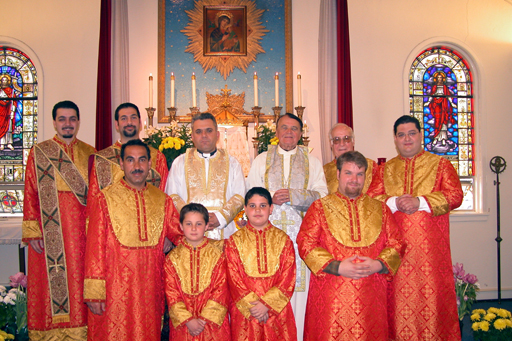Ed Peters has put together another response to the Legionaries of Christ / Regnum Christi (LC/RC) crisis, which is well worth reading. You can check it out here. Since I'm likely to be asked for a response, here's a line-by-line:
I think that Fr. Alvaro Corcuera's apparent claim that he knows nothing about Maciel's behavior, except that Maciel sired a daughter, is utterly unbelievable. I have nothing else to say about this kind of stone-walling. I will simply re-endorse Dr. Germain Grisez's and Mr. George Weigel's proposals for direct intervention by the Holy See.
Out of Christian charity I will assume Fr. Alvaro is telling the truth. The Holy See should intervene anyway. Directly.
The situation is so muddled that I cannot see how the LC/RC can fix it without outside help and expertise. Of course I'm just one canonist out of thousands in the Church. But given how the LC/RC have maintained Fr. Maciel's innocence for years, the severity of the allegations against him - both proven and unproven, and other structural problems within the movement, how the initial response has been bungled, it will be difficult for the LC/RC to regain the trust of orthodox Catholics without assurances that Rome has performed a thorough housecleaning of the movement.
Apologists for the LC/RC are already stating that Fr. Alvaro and the LC/RC are following Rome's instructions. And Rome has stated it has no immediate plans to step in, but would do so if requested by the Legion. So it might be best is the Legion simply go through the official step of asking Rome to step in directly.
Moving on Peters's rebuttal of the "reform-from-within" assertion and the "carry-on-the-charism" assertion:
Assertion 1. Because the Legion and Regnum Christi have within their ranks many obviously good and faithful Catholics, they should be allowed to try a reform from within. Response: the presence of good and faithful Catholics within an organization, particularly when the organization (in terms of Church history, if nothing else) is so young, says almost nothing about whether the organization itself is sound and/or salvageable.
Here is where I think Peters needs to make a distinction. Those making the "reform from within" suggestion (like myself) are not a unified camp. Some maintain the LC/RC should be permitted to reform from within, without any direct outside intervention. Very unlikely to work, as proven by the fact Fr. Maciel got away with his misdeeds for so long. And even if it were possible, there's still the problem of restoring the RC/LC's credibility.
Like Peters, I believe the LC/RC's current structure is deeply flawed, and have for some time, according to criteria developed with Fr. Frank Morrisey - one of the Church's foremost canonical experts on religious law and structures of institutes of consecrated life - and cult expert Michael Langone. You can read a summary of the criteria here. (Please note: I am not claiming that all of these criteria apply to the LC/RC, but those that do need to be rooted out if the LC/RC is to reform.)
Having said that, given that the majority of LC/RC members are orthodox Catholics faithful to Rome, I believe a "reform from within" is possible if the Holy See intervenes directly and appoints someone credible from outside the LC/RC to do a thorough investigation of LC/RC practices, and oversee their reform. It needs to be someone known for prayer and orthodoxy, experienced in religious life, and highly respected within the Church. For example, Cardinal Francis George from Chicago or Archbishop Seán O'Malley from Boston. Of course this assumes LC/RC members cooperate - not only in letter, but in spirit - with the reform.
Such a reform must begin with a sincere apology to Fr. Maciel's victims, followed by restitution. Also, no more excuses suggesting Fr. Maciel's innocence, or trying to dampen the severity of his sins. Of course the structural weaknesses that allowed Fr. Maciel to get away with his double-life for so long must also be fixed. Good faith only gets one so far. Peters identifies the question many canonists are asking, namely whether there are structural problems to the Legion, expressing them as only he can, when he states in response to the second assertion:
There is, I think, at least as much reason to wonder whether Maciel set up an institute in order to assure himself of ample access to sexual targets and unaccountable funds, or whether he suffered from some warped psycho-emotional condition that enabled him to compartmentalize pious devotional practices and sexual predation for decades on end...
Here is where I take a somewhat harder line than Peters. I don't wonder. In fact, I'm pretty sure Fr. Maciel set up the LC/RC to, as I put it in the following interview, acquire, maintain and protect his access to victims.
I won't comment on funds, except to say well-placed sources within and outside the LC/RC told me that Fr. Maciel was frequently given thousands of dollars in cash without any questions being asked. I haven't looked into the issue deeply enough to give it much thought; it's entirely possible the financial irregularities came after, as a by-product of the sexual irregularities. Of course, none of the above excludes the possibility Fr. Maciel also had a serious psychological condition.
But I've skipped ahead a bit. Here's how Peters begins his response to the second assertion:
Assertion 2. Maciel's canonical crime spree was a grave personal failing, but it does not negate the L/RC 'charism', and they should be allowed to continue their work. Response: This argument misses the key question, namely, whether in fact Maciel ever bequeathed an authentic charism to the L/RC...
This, then, is what separates our positions at the moment. If one believes the LC/RC lack a true charism, then Peters is right in suggesting Rome may have to shut down the movement completely and reconstitute it. (Without a true charism, there is nothing to reform.)
On the other hand, if one believes the LC/RC possess a true charism from Christ, but that it has become seriously clouded by Fr. Maciel's sexual vice, then it may still be possible to rescue the charism. Of course it will still require delicate surgery on Rome's part. It's possible the movement is so far gone that the necessary reform is no longer possible. The LC/RC will have to show they are capable of true reform.
Peters then says (skipping over the part I had quoted earlier, out-of-sequence):
I do not know whether the L/RC can (following a complete leadership replacement!) reform itself from within, although I am almost certain that they cannot;
A complete leadership change may be the only thing that can save the LC/RC at this point. Certainly this is how I feel, humanly speaking, although the Holy Spirit could intervene in a way that canonists haven't imagined. But, assuming most of the current leadership was honestly in dark about Fr. Maciel's double-life, this speaks to a weakness in LC/RC formation that so many clergy suspected so little for so long. This is not to say they were bad people or terrible priests - only that they appear to lack a certain skill-set needed to exercise prudent governance over a large religious institute.
This is not uncommon among young institutes of consecrated life where one is dealing with leadership known for its holiness (let alone living a double-life). I've experienced this at least twice in my career as a canon lawyer. A young institute and its young superior come up with some grandiose ideas, or overlook the obvious. An older priest, with several years of priestly experience before joining the institute, jumps in points out what's being overlooked, or otherwise brings some common sense to the discussion. Older priests can help guide a young superior of a young institute through sensitive pastoral issues, temper and focus the zeal of younger newly-ordained priests, and put bishops as ease knowing there is someone with experience keeping an eye on the new institute.
The problem with the current LC/RC superiors is that none of them kept an eye on Fr. Maciel. This is not surprising. Abusers cannot bear close scrutiny, which would threaten their access to victims. Fr. Maciel reportedly handpicked his superiors. Not surprisingly, he often named young priests who lacked practical pastoral experience. Which is why most Catholics would feel more confident about a reform of the LC/RC if Rome stepped in directly.
and I do not know whether Maciel developed an authentic charism for clerical, religious, and lay life, but I have serious doubts that he did.
And now the question of charism. The reason orthodox Catholics have struggled so deeply with the crisis, in fact the reason there are such strong feelings of anger and betrayal, is that the LC/RC's good works have been visible to us for so long. But looking back in retrospect, so too have the institutional signs of Fr. Maciel's double-life. How does one reconcile such a stark contrast?
Normally, an institute's charism is tied to its founder and its good works. However, the two don't match in this case. Some argue that the LC/RC's founding charism was fraudulent from the start. Others argue that God used Fr. Maciel as His imperfect human instrument. In reflecting upon this dilemma, attempting to reconcile these questions in my own mind, I stumbled across the biography of Saint Rafael Guízar Valencia.
Saint Rafael was Fr. Maciel's uncle and the bishop who oversaw most of Fr. Maciel's seminary formation prior to dismissing his nephew from the seminary. Saint Rafael exemplified many of the Christian virtues LC/RC attempt to emulate as members of their movement. In fact, his life story reads like a blueprint for the LC/RC's good works, and LC/RC members in past have recognized his influence in the founding of their movement.
Perhaps - and this is highly speculative on my part - Saint Rafael is the true spiritual founder of the LC/RC movement, and the instrument used by God to transmit its charism. It's something for LC/RC members to pray about.




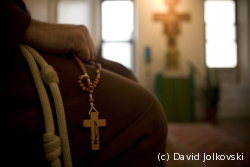
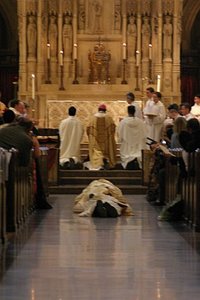
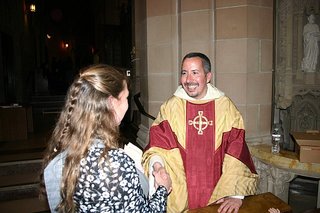
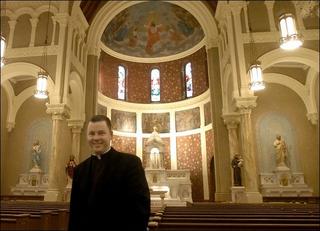


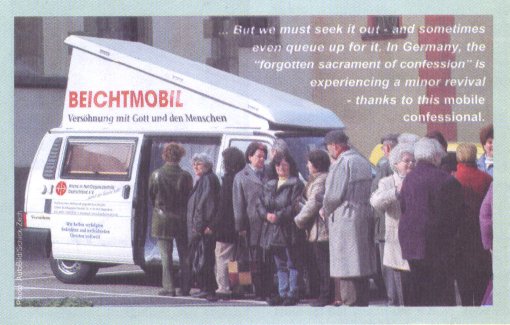 Of course, for the charity
Of course, for the charity 